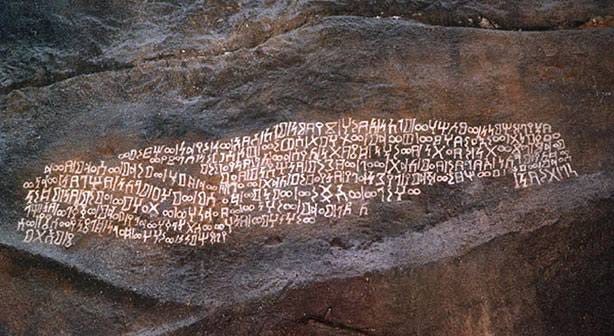WAR ELEPHANTS & THE ULTIMATE INVESTMENT
The text in the image appears to be in the South Arabian script according to AI.
This was used in ancient inscriptions in the Arabian Peninsula. Specifically, it might be the Sabaean or Himyaritic script, commonly used in the region that is now Yemen.
Abraha was a Christian ruler of Yemen who is famous for his attempt to attack the Kaaba in Mecca, an event known in Islamic tradition as the "Year of the Elephant." This event is mentioned in the Quran in Surah Al-Fil.
If this inscription is indeed related to Abraha's army, it could be a historical record or a commemorative text.
Translating ancient South Arabian scripts typically requires expertise in epigraphy and a good understanding of the specific dialect and language used at the time.
For an accurate translation, a specialist in ancient South Arabian languages or a historian with expertise in pre-Islamic Arabian history. Presumably this is what other Islamic scholars have been referencing when presenting this as evidence.
The Year of the Elephant, which marks the event of Abraha's attempted attack on the Kaaba, is traditionally placed around 570 CE in the Gregorian calendar. This year is also significant because it is believed to be the birth year of the Prophet Muhammad SWS.
The Christian king at that time was Abraha, who was the viceroy of the Kingdom of Aksum (Axum), a powerful ancient kingdom located in what is now northern Ethiopia and Eritrea. Abraha ruled over Yemen, which was under Aksumite control during that period. His attempt to attack the Kaaba in Mecca is a well-known event in Islamic tradition.
The story of Abraha's attempt to attack the Kaaba is primarily documented in Islamic tradition, particularly in the Quran and early Islamic historical sources such as the works of Ibn Ishaq and Ibn Hisham.
Non-Islamic sources from the same period do not provide a detailed account of Abraha's expedition to Mecca. However, there are some historical and archaeological sources that offer context about the political and military activities in the region during that time:
1. Inscriptions and Archaeological Evidence: South Arabian inscriptions and archaeological findings provide evidence of Abraha's rule in Yemen and his military campaigns. The inscriptions often detail his construction projects and victories, although they do not specifically mention the attack on the Kaaba.
2. Byzantine and Ethiopian Sources: While there are no detailed contemporary Byzantine or Ethiopian records specifically describing the event, there are references to the Aksumite Empire's influence and activities in Arabia, which corroborate the presence and influence of Christian rulers like Abraha in the region.
3. Pre-Islamic Arabian Poetry: Some pre-Islamic Arabic poetry makes references to the Year of the Elephant and the significance of the event, although these references are often indirect and part of the oral tradition that was later documented by Islamic historians.
Overall, while Islamic sources provide the most detailed narrative of Abraha's attempt to attack the Kaaba, corroborative evidence from inscriptions and the broader historical context supports the existence of his rule and military activities in the region.
Abraha - Wikipedia
As we delve into 'The Direction of Khadijah’ as part of The Maternalist Quartet Series. We talk about business, love, and the backdrop of our favorite businesswoman and her love interest, our beloved Nabi SWS. Discover the strength of Khadijah AS, her courageous intimacy, and her open-minded approach to life regardless of her age and with enduring character.
Join our 2021 discussion: War Elephants & The Ultimate Investment
Explore the fascinating world of pre-Islamic Arabia, from Bedouin raids to the trade of frankincense and myrrh from Yemen. Learn about the legendary year of the Elephant and how other empires used elephants as medieval tanks in siege warfare.
Khadijah AS rose among many thorns as a woman ahead of her time, navigating a chaotic, and superstitious society.
Despite the lack of literacy and education in the environment, she thrived while making impact. She remained a woman of high quality and integrity, yet possessing a strong network within her tribe. She had the leverage and protection of her society, securing her status as an investor in the truest sense but tune in to discover her greatest asset leading to her eternal return on investment…
Join us in finding our direction to Allah SWT with the Best of Women:
🌍🌎🌏🧭🕋🧭🌏🌏🌎
#iman #deen #Khadijah #directions #mecca #prophetmuhammadﷺ #qibla #love #romance #marriage #findinglove #findingtherightpartner #sadaqah #quran #hadith #warelephant #alfil
Subscribe to The Maternalist Quartet channel on YouTube:















